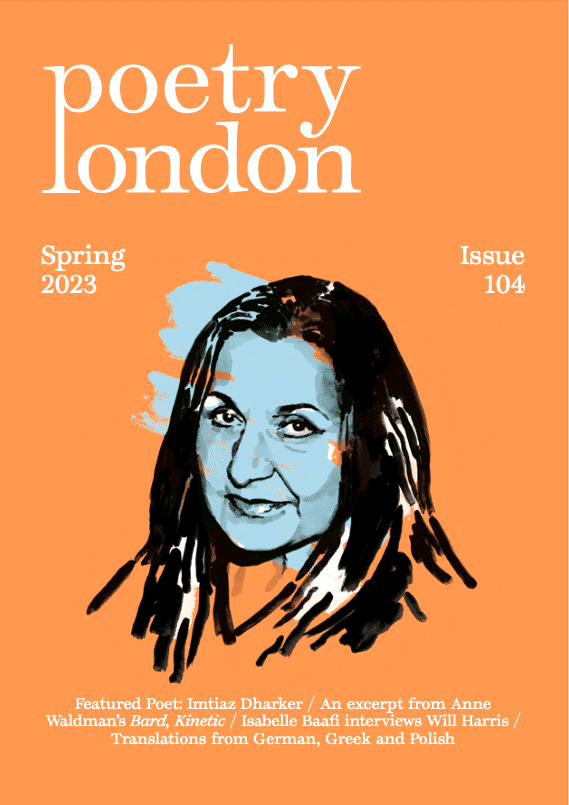Refoundations
André Naffis-Sahely
Much has changed in the world of poetry since we celebrated the launch of our Autumn 2022 issue just five months ago. After sixty-four years in print, Ambit folded just shy of its 250th issue, while The Moth’s Spring 2023 issue will be its last, after thirteen years in print. In January, Penned in the Margins, one of England’s most successful independent poetry publishers, announced that it was going on an indefinite hiatus, barely a year after one of its titles, Luke Kennard’s Notes on the Sonnets, won the Forward Prize for Best Collection. Several organizations were dropped from the Arts Council England’s National Portfolio, and institutions like the English National Opera, the Donmar Warehouse, the ICA, Camden Art Centre, and the Southbank Centre all had their funding cut, or least significantly reduced. Elsewhere, Brexit has ensured a collapse in funding from European initiatives and Michelle Donelan, secretary of state for Department of Science, Innovation and Technology, recently said that the UK is “more than ready to go it alone” if there is no resolution to the ongoing stalemate, much to the dismay of higher-education institutions around the country whose future now looks highly uncertain. It’s precisely at times like these that magazines like the one you’re currently reading need to reaffirm their sense of purpose and mission.
As such, thirty-five years after it was founded, Poetry London is pleased to announce the creation of Poetry London Editions. This new venture will publish pamphlets and book-length collections by emerging talents and established authors, honouring the magazine’s legacy of creating a space where leading voices showcase their most experimental work alongside less established writers. Poetry London Editions is committed to empowering, and uplifting racially and ethnically marginalized writers and we will publish books that deal with issues of migration, economic injustice and freedom of speech, introducing our audiences to poetry of the highest level that also addresses the most pressing issues of our times. We are currently assembling our list of pamphlets and full-length collections, which we will aim to roll out in 2024 and 2025. In the meanwhile, we will celebrate the launch of this new imprint with our inaugural pamphlet competition, which will be judged by Jay Bernard. Readers interested in submitting their work to either our long-running poetry prize, or this new pamphlet prize, will find further details on pages 55 and 56.
Given that the group of poets who founded this magazine in 1988 took their inspiration from an earlier publication called Poetry London, it’s almost impossible not to recall the brilliant list of titles issued by that magazine’s editor, the Tamil poet Meary James Thurairajah Tambimuttu (1915 – 1983). In fact, although few remember his legacy, Tambimuttu published some of the twentieth century’s most original and uncompromising books, including Elizabeth Smart’s By Grand Central Station I Sat Down and Wept, Henry Miller’s The Cosmological Eye, Lawrence Durrell’s Cefalu, Keith Douglas’s Alamein to Zem Zem, and Vladimir Nabokov’s The Real Life of Sebastian Knight. It’s a lot to live up to, but we’re determined to rise to the challenge, and why not? After all, we never know when the reaper might come calling.
In this issue, our featured author Imtiaz Dharker gives us a sneak preview of her latest collection, where she tells the story of how a ‘Shadow Reader’ once predicted her death in 2022, and her experience of living with that prediction. The issue also carries new poems by Karen Solie, Oli Hazzard, Jane Hirshfield, Randall Horton, John Challis, D S Marriott, Qudsia Akhtar, Nicholas Hogg, Christopher Merrill, John McCullough, and Eleni Sikelianos, among others. Translations include work by the German poet Ulrike Almut Sandig, the Greek poet Haris Vlavianos, a Scoto-Japanese-Anglo-Sumerian haiku by Robert Crawford, and a poem drawn from True Life (Farrar, Straus and Giroux), the final collection by the late great Polish poet Adam Zagajewski (1945-2021). Prose contributions include an excerpt from Anne Waldman’s Bard, Kinetic (Coffee House Press), a portrait of her life and praxis as a poet, and an essay by Travis Schuhardt on finding haiku during the pandemic. Elsewhere in these pages, our reviews editor Isabelle Baafi talks with Will Harris about his new collection, Brother Poem (Granta Books), while our critical section engages with new collections by Ilse Aichinger, Rohan Chhetri, Jennifer Elise Foerster, Jane Griffiths, and Alycia Pirmohamed, as well as Mary Jean Chan and Andrew McMillan’s anthology, 100 Queer Poets (Vintage Publishing).
The poems were edited by André Naffis-Sahely. The reviews and featured essay were edited by Isabelle Baafi.


